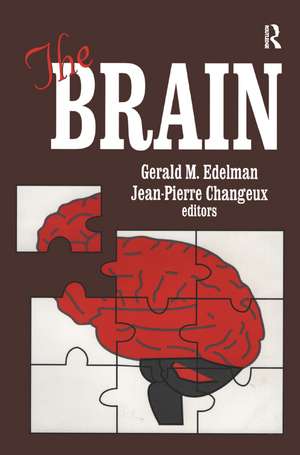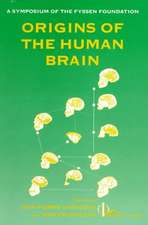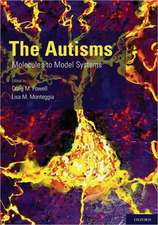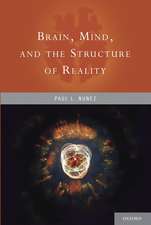The Brain
Autor Jean-Pierre Changeux, Gerald M. Edelmanen Limba Engleză Hardback – 29 ian 2018
| Toate formatele și edițiile | Preț | Express |
|---|---|---|
| Paperback (1) | 417.20 lei 6-8 săpt. | |
| Taylor & Francis – 30 sep 2000 | 417.20 lei 6-8 săpt. | |
| Hardback (1) | 1000.27 lei 6-8 săpt. | |
| Taylor & Francis – 29 ian 2018 | 1000.27 lei 6-8 săpt. |
Preț: 1000.27 lei
Preț vechi: 1219.84 lei
-18% Nou
Puncte Express: 1500
Preț estimativ în valută:
191.40€ • 200.34$ • 159.31£
191.40€ • 200.34$ • 159.31£
Carte tipărită la comandă
Livrare economică 31 martie-14 aprilie
Preluare comenzi: 021 569.72.76
Specificații
ISBN-13: 9781138534506
ISBN-10: 1138534501
Pagini: 320
Dimensiuni: 152 x 229 x 19 mm
Greutate: 0.45 kg
Ediția:1
Editura: Taylor & Francis
Colecția Routledge
Locul publicării:Oxford, United Kingdom
ISBN-10: 1138534501
Pagini: 320
Dimensiuni: 152 x 229 x 19 mm
Greutate: 0.45 kg
Ediția:1
Editura: Taylor & Francis
Colecția Routledge
Locul publicării:Oxford, United Kingdom
Notă biografică
Jean-Pierre Changeux, Gerald M. Edelman
Cuprins
Brain Science at the Century’s Ebb; Building a Picture of the Brain; Art and the Brain; The Functional Architecture of the Brain; From Molecules to Mental States; Drug Use and Abuse; The Quest for the Essence of Sleep; The Evolution and Modification of Brains and Sensory Systems; The Acquisition of Motor Behavior; Unity and Diversity in the Human Brain: Evidence from Injury; Where Brain, Body, and World Collide
Descriere
Over the past 15 years, local money networks, which are essentially trading networks using a community-created currency, have emerged in countries as far apart as Argentina, Australia and New Zealand, Canada and the US, continental Europe and Japan. They range from Local Exchange Trading Schemes (UK), to Time Dollars (US), Green Dollars (New Zealand, Australia and Canada), Trading Circles (Hungary), Barter Networks (Argentina) and Talents (Germany). Drawing on an ethnographic case study of alternative currency movements in Manchester, UK, this book provides an analysis of the motivations, aims, successes and failures of alternative currency networks. It also raises questions such as the contribution of the alternative currency movement to current debates about alternatives to neoliberalism. While it is theoretically informed, critical and grounded in fieldwork, it is also sympathetic to the political aims of the protagonists and cognisant of the non-economic benefits that arise from their development.















